
Services – a future in The Netherlands?

Sjirk van der Goot, Executive Consultant and Founder, Perceive commercial management services
Every person that has ever enjoyed the average service level in bars, restaurants and clubs in The Netherlands and particulary in Amsterdam will have experienced first handed that the Dutch personality and the Dutch mentality are not yet famous for their true service attitudes.
Nevertheless some of us are learning rapidly that the service industry might be our only option left to generate at least some level of economic and social prosperity in The Netherlands in the years to come after the closing and/or outsourcing of almost all Dutch farming and manufacturing industries.
Nowdays we hear a lot about the knowledge society and that The Netherlands should develop towards a knowledge society.
But what is the value of this knowledge when we have no industries left to test the actual value of all our newly developed knowledge and to benefit from it when this knowledge really proves to deliver the added value and increased competitive advantage that we expect from it?
And why should other countries be interested in our “non-tested” knowledge when they have the opportunity to test their own newly developed knowledge in their own industries on a day-to-day basis?
Therefore the service industry might present a better alternative for future economic development in The Netherlands than the knowledge society does.
Sjirk van der Goot is the moderator at our event about the future of the Service Industry:
In this session we will look at three perspectives on the service industry in The Netherlands.
Frank den Butter will look at the history of The Netherlands as a trade nation and point out how the Dutch might even strengthen their traditional position as global traders in our new world of globalization and rapidly evolving information & communication technologies.
Bob Stumpel will look at the use of new technologies in the service industry so far and the lessons learned from these approaches.
Buddy Kluin will show a video with various examples of customer services provided by mobile phone and then discuss the impact of mobile communications on the service industry, both business to consumer and business to business. After the coffee break there will be an open discussion about the future of the service industry in The Netherlands between the three speakers and all participants in the audience.
News about the Future

Aquaculture
Aquaculture is the fastest growing food production system in the world and it accounts for approximately one-third of global fisheries landings. In addition to the production of fisheries products, aquaculture also consumes more fishmeal and fish oil than any other industry. Thus, the combined production and consumption of aquaculture accounts for about half of all fisheries’ production in the world. The rapid expansion of the industry has focused attention on the need for effective management strategies. Such strategies are needed to enhance the positive contributions that shrimp farming and other forms of aquaculture can make to economic growth and poverty alleviation, while controlling negative environmental and social impacts that may accompany poorly planned and regulated developments.
Several hundred different species are farmed around the world both for sale on the international market and for subsistence food production. Global production of farmed aquatic animals and plants in 2000 reached 45.7 million metric tons with an on-farm value of $56.5 billion. Like agricultural farms, aquacultural farms range from small-scale operations for local food production to intensive, mechanized operations geared towards export. Farmed species that are traded in volume on the international market include oyster, tilapia, catfish, trout, mussels, and scallops. Shrimp and salmon, two of the most valuable species, are also traded widely.

Concept-Foods
“The food industry needs new shapes, new textures, new styles”, said Edouard Malbois, who heads the world’s self-proclaimed first designer food consultancy firm, Enivrance. “Our job is Imaginary Foods, a new discipline linking the real world and the world of fantasy.”
Enivrance, which is developing designer foods for the likes of McDonalds, Lavazza and Barilla, and has worked with top stores such as Harrods of London and Galeries Lafayette in Paris, unveils its latest creations: The “Earth Egg” prototype has a crusty cereal-like shell with a green creamy substance posing as the white and soja-sprouts and other veggie featuring as the yolk.
Next Event: Services – a future in The Netherlands?
The Future of the European Union
The Future of the European Union
By Dr Patrick Dixon
Try to imagine what historians will write about Europe in the year 2100.
Did integration succeeed in preventing a Third World War – as was the hope of the founders of the European Union? How stable was the Union after expansion to include many former Eastern bloc nations? What was the outcome of major showdowns between The Federal States of Europe and America through 2020-2030? How did the Union cope with massive influx of foreign nationals? What happened to national parliaments, laws, markets, languages and cultures?
Major challenges to the future of Europe lie ahead. If the great experiment succeeds, it will create an economic, political and military force to pose real challenges to the United States, with its enlargement to 25 countries and a population approaching 500 million. Expansion will add 23% to the EU’s land area and bring in 75 million additional citizens, with a combined economy of $9.3 trillion, approaching that of the U.S.
The Most Likely Future for Europe
The most likely scenario for the future of the EU over the next decade and a half will be slow but steady progress towards integration, held back by the rich diversity of cultures and economic situations. A Greater Europe cannot be built without strong EU governance and visionary leadership, yet these are the two issues which are notably missing at present.
The European Parliament does not command the same sense of respect as national Parliaments, nor the connection with ordinary people. This is a serious problem. Who makes decisions in Europe anyway? Is it EU councils of Ministers who are appointed by their own governments? Is it elected representatives of the people (MEPs)? And that is the heart of the problem.
[…]
Impressions from the Summit for the Future 2005
| The Summit for the Future turned out to be a fantastic event. With delegates from than 30 countries, 22 partners, 40 high quality speakers – a great athmosphere producing inspiring discussions, interdisciplinary insights or simply energy for innovation! |
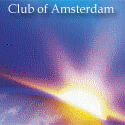
Recommended Book

The Medici Effect: Breakthrough Insights at the Intersection of Ideas, Concepts, and Cultures
by Frans Johansson
Why is it that so many world-changing insights come from people with little or no related experience? Charles Darwin, after all, was a geologist when he proposed the theory of evolution. And it was an astronomer who finally explained what happened to the dinosaurs. Frans Johansson argues that breakthrough ideas most often occur when we bring concepts from one field into new, unfamiliar territory. In this space – which Johansson calls “the Intersection” – established ideas clash and combine with insights from other fields, disciplines, and cultures, resulting in an explosion of totally new ideas. The Medici Effect – referring to a remarkable burst of creativity in Florence during the Renaissance – shows us how to get to the Intersection and how we can turn the ideas we discover there into path-breaking innovations. From the insight that created the first Cherokee written language to the ideas that enabled scientists to read the mind of a monkey – The Medici Effect is filled with vivid stories of intersections across domains as diverse as business, science, art, and politics. Johansson reveals the core principles – including breaking down associative barriers, routinely combining unlike concepts, and executing past your failures – that can enable individuals, teams, and entire organizations to create their own “Medici effects” in any arena of work and life. Frans Johansson is a writer, consultant, and entrepreneur residing in New York City.
Ocean Arks International
| Ocean Arks International “We work on the premise that it is possible to create a sustainable society in the early 21st century. Such a society would be embedded with an Earth stewardship ethic. We believe it is possible to reverse today’s loss of soils, forests and water quality as well as to slow or even arrest the wide spread loss of species.” Treating Wastes and Protecting Waters For over a decade Ocean Arks International has been developing floating ecological technologies to enhance water quality and restore polluted bodies of water. These Restorer technologies can accomplish a variety of tasks in both natural and constructed bodies of water. They have the ability to purify wastewater, maintain pond health or restore stressed natural bodies of water. Recent developments include Restorers treating food-processing and agricultural wastes in constructed lagoons. Other examples include protecting and upgrading secondary drinking water supplies and reducing algae in brackish water. In natural ponds, they rejuvenate water badly impacted from landfill and septic tank lagoon wastes and reduce the impact of eutrophication, or nutrient enrichment. Applications in the developing world, particularly in urban areas, are endless. They have the capability, when integrated with other natural systems technologies, to treat sewage to advanced wastewater and water reuse standards. |
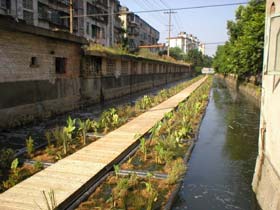 |
Impact on Water Quality Restorers support a wide spectrum of treatment processes and the organisms responsible for the treatment, creating an economical and effective system. They can reduce organic loading or Biochemical Oxygen Demand (BOD), improve water clarity through Total Suspended Solids (TSS) reduction and lower fats, oils and greases (FOG) in the water. Ammonia, nitrate, TKN and fecal coliform levels are also reduced. They have the capability of removing pathogens, priority pollutants and heavy metals from the water. They also can decrease nutrient levels, including nitrogen and phosphorus. Nitrification is enhanced and denitrification can be incorporated into Restorer designs. Restorers function in many ways like conventional waste treatment systems but also enhance the dynamic ecological cycles within the lagoons, ponds, lakes and canals in which they reside. Purified water can be polished for non-potable reuse such as irrigation, toilet flushing, agricultural wash down, industrial clean-in-place (CIP) routines or cooling tower influent. |
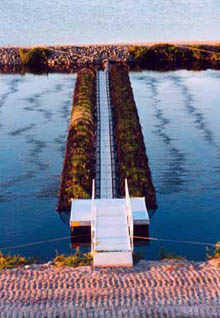 |
The Water Stewards Network The Water Stewards Network is our vehicle for disseminating the practices of water stewardship that can empower communities to retain, or regain, their autonomy and integrity amidst the tides of globalization. This grassroots initiative was launched in the summer of 2003 in response to the current state of global water politics. Corporations, international trade and development agencies, and governments are forcibly turning water into a commodity and placing its management in the hands of the free market. This approach is leaving a path of ecological, economic and cultural destruction in its wake. There is a mounting international campaign, however, rising in opposition to these trends in policy – peoples’ movements emerging from every region of the globe demanding that water remain in the commons as a human right. There is no doubt that we are on a sure path to a freshwater crisis in the near future. In order to turn this situation around it is imperative that we begin to implement sustainable solutions to our water problems immediately. The issue of corporate control is, of course, highly important, yet we feel the global dialogue is deficient in the area of alternatives. The Water Stewards Network is building and distributing a ‘toolbox’ of information on the many facets of water management that will enable people to take responsibility for the local water resources. We cannot wait for governments to come to agreement on the issues surrounding the privatization of ‘the commons’. The people of the world need to act now to ensure a water secure future. Advanced Farm Ecosystems Aquaculture Research and Development: Our aquaculture program is centered on systems that are self-sustaining and do not rely on feeds containing ocean harvested fishmeal. The goal is to create efficient recirculating systems that produce high quality fish, shrimp and hydroponic produce without the need for energy intensive waste treatment. Mycology and Mushroom Research and Development: Our mycology and mushroom program is focused on the establishment of a comprehensive native culture library as well as the cultivation of gourmet and medicinal mushrooms. The native culture library is used to match valuable species to available substrates, as a source of native biological material to remediate damaged ecosystems and to investigate unknown ecological and medicinal properties. Cultivation of mushrooms in the ecological food production system is accomplished using waste organic materials directly or in the form of compost. Neighboring industries, such as breweries, and farms supply suitable materials for mushroom growth. |
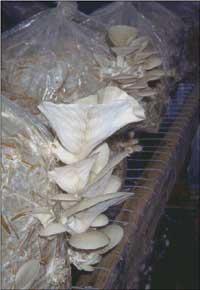 |
Club of Amsterdam Agenda
| Club of Amsterdam Season 2004/2005 | |
| .February 23, 2005 | the future of the Service Industry |
| .March 30, 2005 | the future of Water |
| .April 27, 2005 | the future of Branding |
| .June 1, 2005 | the future of Robotics |
| .June 29, 2005 | the future of Philosophy |
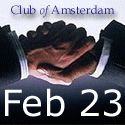 |


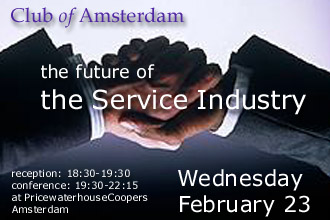



Customer Reviews
Thanks for submitting your comment!